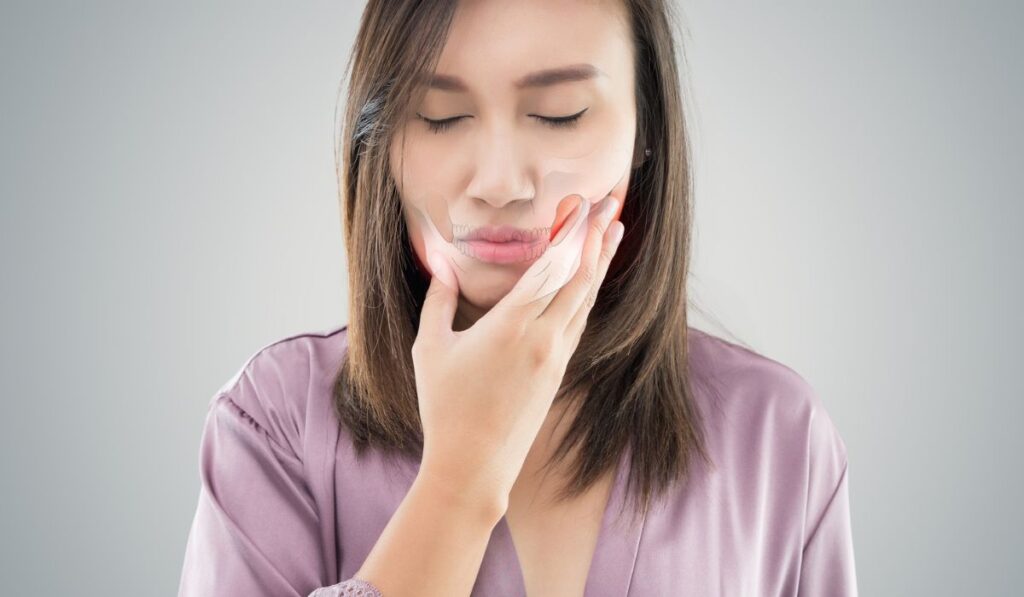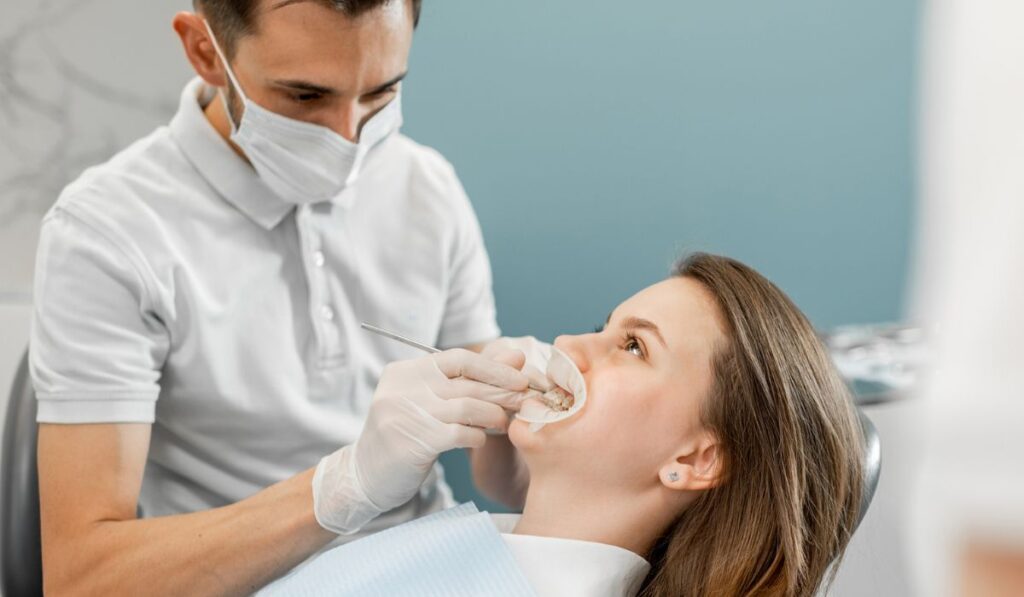If you regularly experience pain in your jaw, facial muscles, or earlobe, it may be linked to what is known as TMD — a disorder that causes pain in the jaw joint and the muscles that control your jaw. While TMD is usually manageable, the symptoms can get severe at times. So, how long does TMD last?
TMD symptoms can last from a couple of days to a couple of weeks with treatment, but they may persist for longer if they go untreated. How long symptoms last often depends on what’s causing the disorder. Those with certain underlying conditions may experience symptoms on a regular basis.
Let’s take a closer look at what causes TMD, when you’re most likely to experience flare-ups, and possible treatment options. That way, you can figure out how best to proceed.
What Is TMD?

TMD refers to more than 30 conditions that that affect the temporomandibular joint, causing swelling, pain, or dysfunction in the jaw.
TMD conditions may be caused by an injured jaw or as a symptom of an underlying medical condition. A TMD disorder can result in flare-ups, which will result in pain at different intervals.
Symptoms of TMD include:
- Irregular jaw pain
- Headaches associated with jaw pain
- Pain in the ligaments around the jaw, which may result in difficulty in eating or drinking
TMD usually has mild symptoms and may only get worse occasionally. However, it can disrupt your lifestyle and result in sleeping, speech, and eating problems. If the symptoms become unbearable or get worse over time, it’s usually a sign that the underlying cause is getting worse.
What Are the Causes of TMD?
While arthritis and several other medical problems may cause TMD, the primary cause is usually a dental one. TMD is more common among people with misaligned or damaged teeth, so taking care of your oral health may reduce the risk of getting this disorder.
Some of the primary causes of TMD include:
Arthritis
Older individuals above the age of 35 are most likely to develop TMD since the muscles and bones attached to the jaw become worn out over time.
People with arthritis are most likely to get TMD, and they may feel pain in other areas apart from the jaw.
Arthritis is often associated with weak bones, stress, and vitamin deficiency, so maintaining a healthy diet will help reduce the risk of developing this underlying condition.
Misaligned Teeth
If you have misaligned teeth, you’re more likely to develop TMD disorders since your bite will place more stress on the jaw. This applies to both an underbite and an overbite, and the issue often manifests itself later on in life.
Fortunately, misaligned teeth can be treated effectively with braces and other dental procedures. If you have slight teeth misalignment that doesn’t cause jaw pain, there’s no need for concern.
However, if the tooth misalignment problem causes major bite problems, it’s best to correct it before you develop a TMD disorder.
Jaw Injury
If you’ve had an injury to your teeth or jaw, it may result in TMD. The type of symptoms you’ll experience will often depend on the nature of your injury. However, as with most injuries, your jaw pain will go away when the jaw heals.
Teeth Clenching
People with a habit of teeth clenching or grinding may also suffer from TMD. Grinding your teeth can put stress on the jaw, resulting in occasional pain and TMD flare-ups.
The same goes for chewing too much, eating foods that hurt your jaws, or having poor oral hygiene.
So, if you chew gum all day long and you start to develop TMD symptoms, leave the gum-chewing habit immediately!
Medication or Alcohol
If you have mild TMD symptoms, certain medications or alcohol may make these symptoms worse. This is especially true for sour alcohol varieties, wine, and other sour drinks. If you suspect that a certain medication is behind your TMD flare-ups, bring it to the notice of your doctor so they can suggest an alternative medication.
How Long Does TMD Last?
TMD symptoms can range from mild tingling sensations to severe pain that may affect your speech and hearing ability. Fortunately, most TMD symptoms are easy to manage initially.
However, TMD does get worse if you don’t treat it, and many of the symptoms are chronic.
TMD will last anywhere from a couple of days to a couple of weeks with treatment. However, the symptoms may be persistent if you don’t treat them. How long TMD symptoms last often depends on what’s causing the disorder.
If you’re experiencing TMD symptoms because of an injury, the symptoms should go away when your injury heals. However, if you have arthritis or other underlying conditions, you may experience regularly occurring TMD symptoms.
The only way to treat this condition for good is to treat the underlying cause.
When Does TMD Typically Occur?
TMD is most likely to occur if you have a jaw injury, and those with TMD typically notice exaggerated symptoms after visiting a dentist or when you eat or drink sour foods. Mental stress can also increase the intensity of TMD symptoms.
TMD symptoms tend to appear when:
You’re Under Mental Stress
Mental stress itself won’t affect your TMD symptoms, but it may cause you to grind your teeth, which can bring about a TMD flare-up. You might also grind your teeth when angry or excited, and this can result in jaw pain.
You Visit a Dentist
While a dental checkup shouldn’t be problematic for most people, it can cause pain if you already have TMD symptoms. Always inform your dentist if you experience pain in the jaw or facial muscles, so they can check for dental causes.
You Eat Sour Foods
Sour foods, alcohol, hard candy, and other chewy foods can be taxing on your jaw, resulting in TMD flare-ups. Many people complain of jaw pain after eating sour foods or consuming alcohol.
While these foods won’t cause TMD, they may make the symptoms worse. Avoid them if you’ve previously experienced TMD symptoms.
You Get a Jaw Injury
Injuring your jaw during physical activity can also make TMD symptoms worse. If you have arthritis or TMD before the injury, you’ll experience significant pain, even if the injury is minor.
Always wear a mouthguard (on Amazon) when playing sports to protect your teeth, especially if you have arthritis or TMD.
Treatment Options

Before you can treat TMD symptoms, you’ll have to determine the underlying cause. If a dental problem is the main cause, you’ll have to visit a dentist.
If your symptoms become worse when you’re under stress or consume certain foods, you’ll have to manage your diet and lifestyle.
Here are some treatment options for TMD:
- Visit a dentist: If you have jaw pain, visit a dentist for a checkup to confirm whether it’s a dental problem that’s causing the TMD symptoms.
- Manage your lifestyle: Managing your lifestyle by eating healthily, exercising regularly, and staying positive can reduce stress and reduce TMD flare-ups.
- Avoid sour, chewy, and hard foods: If you experience TMD symptoms after eating certain foods, remove these foods from your diet.


